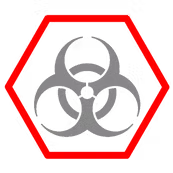Give Us a Call (866) 305-9001
The rules and regulations laid out by the Medical Waste Management Act are vast and can be a bit confusing. We’ve broken down some of the key points on this page to try and simplify things and keep our customers compliant.
Segregation and Storage
Rules for containerizing and storing medical waste vary depending or the type of waste. The following rules apply. For complete rules see Chapter 9 of the Medical Waste Mgmt Act
Medical waste must be contained separately from other waste at the point of origin in the healthcare facility. Sharps containers may be placed in biohazard bags or in containers with biohazard bags.
To containerize biohazard bags, a person must do all of the following:
To containerize sharps waste, a facility must do all of the following:
Storage Time

We serve facilities of all sizes and specialize in the collection, transportation, treatment, and disposal of medical waste.

Our compliant sharps container disposal ensures staff protection and maintains safety in healthcare environments and other facilities.

Our pharmaceutical waste solutions are designed to help healthcare facilities efficiently and compliantly manage pharmaceutical waste.
Medical waste refers to any waste generated during the diagnosis, treatment, or immunization of humans or animals or the production or testing of biological substances. It can include items like used needles, contaminated gloves, expired medications, and more.
Proper medical waste disposal is crucial to prevent the spread of infections, protect the environment, and comply with regulations. Incorrect disposal can harm healthcare workers, waste handlers, and the general public.
Medical waste is generated by healthcare facilities, including hospitals, clinics, doctor’s offices, dental practices, laboratories, and even at home for individuals with medical conditions.
Medical waste is typically categorized into four types: infectious waste, hazardous waste, radioactive waste, and general (non-hazardous) waste.
Improper disposal can lead to environmental contamination, health risks, legal consequences, and damage to a facility’s reputation. Non-compliance with regulations can result in fines and penalties.
Common medical waste items include used syringes, bandages, gloves, cultures, tissues, expired pharmaceuticals, body parts, and personal protective equipment (PPE).
Sharps should be placed in puncture-resistant containers, labeled as “sharps,” and should not be overfilled. These containers must be sealed securely before disposal.
Medical waste disposal is subject to both federal and state regulations in many countries. In the United States, the Environmental Protection Agency (EPA) and the Department of Transportation (DOT) have guidelines, while individual states may have their own regulations.
You can search for licensed medical waste disposal services in your area by contacting your state’s environmental agency or by searching online directories. It’s important to choose a reputable and compliant service such as Emergency Response Medical Waste Disposal. Give us a call today! (566) 305-9001
The cost of medical waste disposal varies depending on factors such as the volume of waste generated, the type of waste, and the service provider. It’s advisable to request quotes from multiple providers